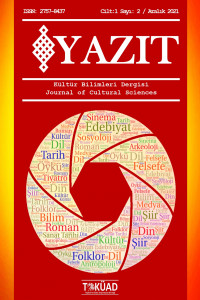Research Article
Year 2021,
Volume: 1 Issue: 2, 123 - 133, 16.12.2021
Abstract
Many new articles are written about Shiism every day both in Turkey and in international academia. However, since a considerable number of these articles are the focus of local studies, they are followed with limited certainty and the basic paradigms of the subject are usually not discussed. The folkloric and lite-rary repetition of previous literature as tradition and the insistence on the copy-paste method with the abandonment of a new perspective is reflected in Shiism studies as one of the main problems of social sciences. This study will begin by discussing the extent to which the relationship between Shiism and Ahmet Yesevî, which is strongly asserted in the current literature, is fundamen-tally true. Furthermore, the historical consideration of the concept of Khorasan in oral culture will be continued, the identity of Vefâi, which is included in some sources and considered one of the most important names in relation to Shiism, and its influence on Anatolian Shiism will be presented with a different interp-retation based on newly found information. It is highlighted what should be the crossroads of the academy in terms of new approaches and depth of connecti-ons with history, sociology and other disciplines.
Keywords
References
- Aksoy, Mustafa (2006). “Türk Kültüründe Alevilik”. International Journal of Human Sciences, 1(1).
- Arıkan, Adem (2010). Büyük Selçuklular Döneminde Şîa. Doktora Tezi. İstanbul: İstanbul Üniversitesi Sosyal Bilimler Enstitüsü.
- Bal, Hüseyin (2011). “Dini Grupların Anlamı, Sınıflandırılması ve Alevi-Bektaşi Gruplar”. ZFWT Zeitschrift für die Welt der Türken-Journal of World of Turks, 3(3): 23-47.
- Bermek, Doğan (1999). “Alevilik-Bektaşilik-Mevlevilik Ritüelleri Üzerine”. Cem, XXXI(90): 42-46.
- Kaçmaz, Ömer (2006). Tacû’l-Ârifin Seyyid Ebû’l-Vefâ’nin Tarihsel Yaşamı, Vefâîlik Hareketinin (Tarikatinin) Anadolu Selçuklu Devleti’nin Yıkılışında ve Osmanlı Beyliği’nin Kuruluşundaki Önemi ve Ebû’l-Vefâ Menâkib-Nâmesi’nin Edisyon-Kritik Metni. Yüksek Lisans Tezi. Eskişehir: Anadolu Üniversitesi Sosyal Bilimler Enstitüsü.
- Köprülü, Fuad (2005). Türk Edebiyatında İlk Mutasavvuflar. Ankara: Diyanet İşleri Başkanlığı.
- Ocak, Ahmet Yaşar (1980). Babaîler İsyanı. İstanbul: Dergâh Yayınları.
- Ocak, Ahmet Yaşar (1993). “Türk Dünyasında Ahmed-iYesevî ve Yesevîlik Kültürünün Yayılışı: Bir Sufi Kültürün Yeniden Güncellenmesi”. Milletlerarası Hoca Ahmed Yesevî Sempozyumu Bildirileri (26-29 Mayıs 1993). Haz. Abdulkadir Yuvalı vd. Kayseri: Erciyes Üniversitesi Yayınları, 299-306.
- Öz, Baki (1993). “Osmanlı’nın Devlet Oluşuna Alevilerin Katkısı I”. Cem, III(26): 29-31.
- Şalbayev, Aydos (2005). Oğuzların Göçleri ve Yayılımları. Doktora Tezi. Ankara: Gazi Üniversitesi Sosyal Bilimler Enstitüsü.
- Taplamacıoğlu, Mehmet (1983). Din Sosyolojisi. Ankara: Ankara Üniversitesi İlahiyat Fakültesi Yayınları.
- Turan, Osman (2005). Türk Cihan Hakimiyeti Mefkuresi Tarihi. İstanbul: Ötüken Yayınları.
- Uslu, Recep (1997). Hicri I-II. Yüzyıllarda Horasan Tarihi. Doktora Tezi. Bursa: Uludağ Üniversitesi Sosyal Bilimler Enstitüsü.
- Yılmaz, Hulusi (2009) “Nizarî İsmailîliği ve Alevilik: İki Farklı Dinî İdrakte Benzeşen Yorumlar Üzerine Değerlendirmeler”. Karadeniz Araştırmaları, 6(22): 123-133.
Year 2021,
Volume: 1 Issue: 2, 123 - 133, 16.12.2021
Abstract
Alevilik konusunda her geçen gün gerek Türkiye gerekse dünya akademisinde birçok yeni yazı kaleme alınmaktadır. Ancak bu yazıların önemli bir bölümü yerel çalışmalar merkezinde olduğundan ilgili sınırlı bir kesim tarafından takip edilmekte ve konunun temel paradigmaları genellikle tartışılmamaktadır. Halkbilimi ve edebiyat merkezli çalışmaların daha önceki literatürü bir gelenek halinde tekrar etmesi ve yeni bir bakış açısından uzak durarak copu past yönteminde ısrarcılığı sosyal bilimlerin temel sorunlarından biri olarak Alevilik çalışmalarında da yansımasını bulmaktadır. Bu çalışma mevcut literatürde yoğun bir şekilde iddia edilen Alevilik ve Ahmet Yesevî ilişkisinin temel itibarla ne derece doğru olduğu tartışmasından başlayacak ve sözlü kültürde yer alan Horasan kavramının tarihsel görünümüyle devam ederek bazı kaynaklarda yer alan ve Alevilik açısından en önemli isimlerden biri olarak kabul edilen Vefâi’nin kimliği ve Anadolu Aleviliğine etkisi açısından yeni bulunan bilgilerden hareketle farklı bir yorumla sunulacaktır. Tarih, sosyoloji ve diğer disiplinlerle olan bağlantıların yeni yaklaşımlar açısından ve derinliklilik noktasında akademinin yol ayrımının neler olması hususu vurgulanacaktır.
Keywords
References
- Aksoy, Mustafa (2006). “Türk Kültüründe Alevilik”. International Journal of Human Sciences, 1(1).
- Arıkan, Adem (2010). Büyük Selçuklular Döneminde Şîa. Doktora Tezi. İstanbul: İstanbul Üniversitesi Sosyal Bilimler Enstitüsü.
- Bal, Hüseyin (2011). “Dini Grupların Anlamı, Sınıflandırılması ve Alevi-Bektaşi Gruplar”. ZFWT Zeitschrift für die Welt der Türken-Journal of World of Turks, 3(3): 23-47.
- Bermek, Doğan (1999). “Alevilik-Bektaşilik-Mevlevilik Ritüelleri Üzerine”. Cem, XXXI(90): 42-46.
- Kaçmaz, Ömer (2006). Tacû’l-Ârifin Seyyid Ebû’l-Vefâ’nin Tarihsel Yaşamı, Vefâîlik Hareketinin (Tarikatinin) Anadolu Selçuklu Devleti’nin Yıkılışında ve Osmanlı Beyliği’nin Kuruluşundaki Önemi ve Ebû’l-Vefâ Menâkib-Nâmesi’nin Edisyon-Kritik Metni. Yüksek Lisans Tezi. Eskişehir: Anadolu Üniversitesi Sosyal Bilimler Enstitüsü.
- Köprülü, Fuad (2005). Türk Edebiyatında İlk Mutasavvuflar. Ankara: Diyanet İşleri Başkanlığı.
- Ocak, Ahmet Yaşar (1980). Babaîler İsyanı. İstanbul: Dergâh Yayınları.
- Ocak, Ahmet Yaşar (1993). “Türk Dünyasında Ahmed-iYesevî ve Yesevîlik Kültürünün Yayılışı: Bir Sufi Kültürün Yeniden Güncellenmesi”. Milletlerarası Hoca Ahmed Yesevî Sempozyumu Bildirileri (26-29 Mayıs 1993). Haz. Abdulkadir Yuvalı vd. Kayseri: Erciyes Üniversitesi Yayınları, 299-306.
- Öz, Baki (1993). “Osmanlı’nın Devlet Oluşuna Alevilerin Katkısı I”. Cem, III(26): 29-31.
- Şalbayev, Aydos (2005). Oğuzların Göçleri ve Yayılımları. Doktora Tezi. Ankara: Gazi Üniversitesi Sosyal Bilimler Enstitüsü.
- Taplamacıoğlu, Mehmet (1983). Din Sosyolojisi. Ankara: Ankara Üniversitesi İlahiyat Fakültesi Yayınları.
- Turan, Osman (2005). Türk Cihan Hakimiyeti Mefkuresi Tarihi. İstanbul: Ötüken Yayınları.
- Uslu, Recep (1997). Hicri I-II. Yüzyıllarda Horasan Tarihi. Doktora Tezi. Bursa: Uludağ Üniversitesi Sosyal Bilimler Enstitüsü.
- Yılmaz, Hulusi (2009) “Nizarî İsmailîliği ve Alevilik: İki Farklı Dinî İdrakte Benzeşen Yorumlar Üzerine Değerlendirmeler”. Karadeniz Araştırmaları, 6(22): 123-133.
There are 14 citations in total.
Details
| Primary Language | Turkish |
|---|---|
| Subjects | Cultural Studies, Turkish Folklore, Religious Studies |
| Journal Section | Research Articles |
| Authors | |
| Publication Date | December 16, 2021 |
| Published in Issue | Year 2021 Volume: 1 Issue: 2 |

